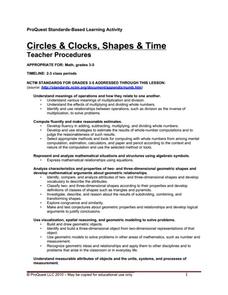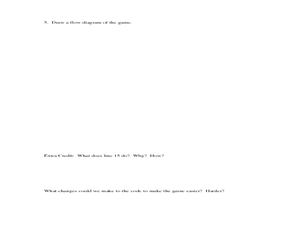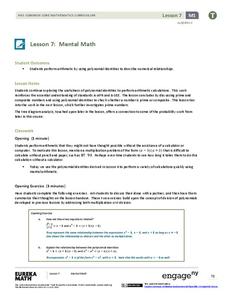Curated OER
Number: Time
Students calculate time in decimals and fractions. In this time lesson, students divide hours into equal sections. They discuss how fractions and decimals correspond to hours and minutes.
Curated OER
Circles and Clocks, Shapes and Time
Students work in groups to research clocks and practice telling time. In this telling time lesson, students use the computer program ProQuest to study circles, including radius and diameter, and practice drawing circles using a compass....
Curated OER
Adding and Subtracting Polynomials
For use with a TI-nspire calculator, this lesson focuses on adding and subtracting polynomials. Learners use calculator to add and subtract polynomials using both the vertical method horizontal methods. A class discussion follows the...
Virginia Department of Education
Simplifying Square Roots of Whole Numbers
Simplify your life by using a resource on simplifying square roots. Pupils review square roots and calculate values of given radical expressions using a calculator. The lesson concludes by having them consider the results to develop the...
Curated OER
TI Math, Games
Students solve problems using technology. In this algebra lesson, students apply flow diagrams and computer codes to solve problems. They use the TI to view the graphs.
Curated OER
Daily Time Ratios
Learners track and record how much time they spend on each activity. In this spreadsheet lesson, students apply different functions using Microsoft excel to format cells and calculate the sum of their total time spent each day. They...
Curated OER
Exam Review: Chemistry Calculations
In this chemistry calculations review worksheet, students solve 33 review problems about titrations, precipitates, pressure and volume of gases, combustion reactions, heat of combustion, molar concentrations and molecular formulas.
Curated OER
The Winter Olympics and Elementary Math Lesson Plans
Tune into the many elementary math lessons, and learning opportunities during the Winter Olympic Games.
Curated OER
Let's Try Various Calculations
Students explore math facts. In this calculation and math facts lesson, students play a board game in which addition, subtraction, multiplication, and division math facts are practiced. A copy of the game is included.
Curated OER
Reading to Calculate
Students examine the calculator. In this math lesson, students use the directions to learn how to use a calculator. Students apply the knowledge and solve problems using the calculator.
EngageNY
Measuring Variability for Symmetrical Distributions
How do we measure the deviation of data points from the mean? An enriching activity walks your class through the steps to calculate the standard deviation. Guiding questions connect the steps to the context, so the process...
EngageNY
Interpreting Residuals from a Line
What does an animal's gestation period have to do with its longevity? Use residuals to determine the prediction errors based upon a least-square regression line. This second lesson plan on residuals shows how to use residuals to...
EngageNY
Mental Math
Faster than a speedy calculator! Show your classes how to use polynomial identities to multiply numbers quickly using mental math.
EngageNY
Modeling a Context from Data (part 2)
Forgive me, I regress. Building upon previous modeling activities, the class examines models using the regression function on a graphing calculator. They use the modeling process to interpret the context and to make predictions...
Teach Engineering
Energy Basics
Power up your lessons with an energetic resource. Scholars learn about work, force, energy, and power. They consider the relationships between these quantities through hockey puck scenarios and make calculations using formulas.
EngageNY
The Decimal Expansion of Some Irrational Numbers
Develop a definition of irrational numbers through an exploration of square roots. The 11th lesson in this series of 25 asks scholars to estimate the value of a square root. Learners observe as the estimation extends further and further...
University of Colorado
Modeling Sizes of Planets
The density of the huge planet of Saturn is 0.7 g/cm3, which means it could float in water! In the second part of 22, science pupils explore the size and order of the planets. They then calculate weight and/or gravity and density of...
Federal Reserve Bank
Savvy Savers
What are the benefits and risks of saving in an interest-bearing account? Pupils explore concepts like risk-reward relationship and the rule of 72, as well as practice calculating compound interest, developing important personal...
Curated OER
Similarity and Dilations - Discover Properties of Similar Figures
Learners investigate properties of similar figures. In this properties of similar figures lesson, pupils construct similar figures using Cabri Jr. They dilate their figure to create a similar one, and discuss the relationships between...
EngageNY
How Far Away Is the Moon?
Does the space shuttle have an odometer? Maybe, but all that is needed to determine the distance to the moon is a little geometry! The lesson asks scholars to sketch the relationship of the Earth and moon using shadows of an eclipse....
EngageNY
Getting a Handle on New Transformations 1
In the first of a two-day lesson on transformations with matrix notation the class transforms the unit square using general transformations, then calculates the area of the transformed image. They discover it is the same as finding...
EngageNY
Expected Value of a Discrete Random Variable
Discover how to calculate the expected value of a random variable. In the seventh installment of a 21-part module, young mathematicians develop the formula for expected value. They connect this concept the dot product of vectors.
EngageNY
The Computation of the Slope of a Non-Vertical Line
Determine the slope when the unit rate is difficult to see. The 17th part of a 33-part series presents a situation that calls for a method to calculate the slope for any two points. It provides examples when the slope is hard to...























